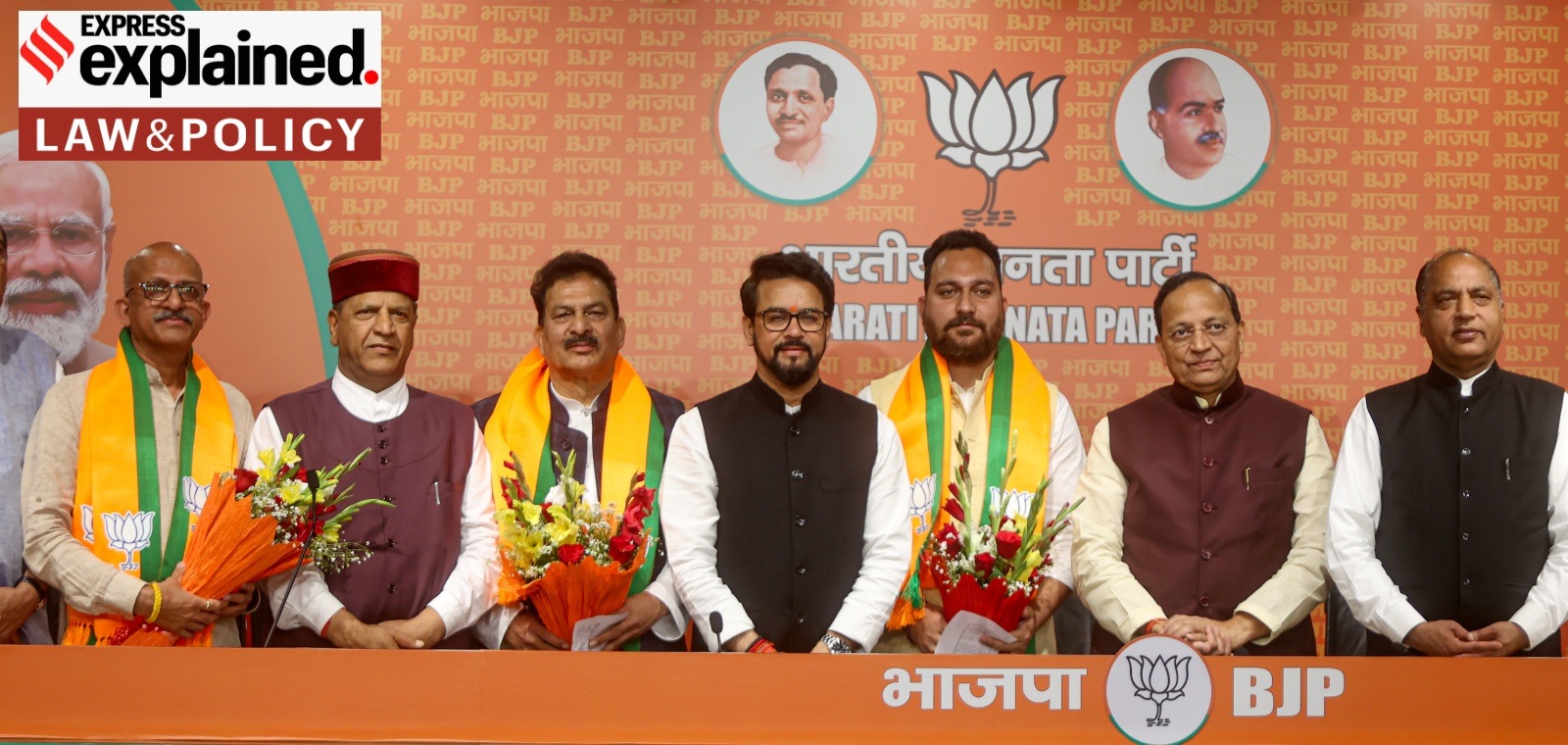Himachal Pradesh HC split verdict: Can courts impose a timeline on Speakers’ acceptance of MLA resignations?
The case pertains to the Rajya Sabha elections for the single vacant seat in the Congress-ruled Himachal Pradesh which took place in February 2024. In the elections, BJP-candidate Harsh Mahajan unexpectedly beat Congress-candidate Senior Advocate Abhishek Manu Singhvi.
 Himachal Pradesh's independent MLAs, KL Thakur, Hoshiyar Singh, and Ashish Sharma, join BJP in the presence of Union Minister Anurag Thakur, Jairam Thakur, and Arun Singh at BJP HQ in New Delhi in March 2024. (Praveen Khanna)
Himachal Pradesh's independent MLAs, KL Thakur, Hoshiyar Singh, and Ashish Sharma, join BJP in the presence of Union Minister Anurag Thakur, Jairam Thakur, and Arun Singh at BJP HQ in New Delhi in March 2024. (Praveen Khanna) A Division Bench of the Himachal Pradesh High Court delivered a split decision on whether it can direct the Speaker of the Himachal Pradesh Assembly to accept resignation letters from MLAs within a specified time frame.
In their ruling, Chief Justice M S Ramachandra Rao refused to interfere with the Speaker’s decision, but Justice Jyotsna Rewal Dua gave the Speaker two weeks to decide on the resignation.
Here is a look at what the case is, what the law says about the resignation of MLAs, why the judges disagreed with each other, and what can happen next.
What is the case?
The case pertains to the Rajya Sabha elections for the single vacant seat in the Congress-ruled Himachal Pradesh which took place in February 2024. In the elections, BJP-candidate Harsh Mahajan unexpectedly beat Congress-candidate Senior Advocate Abhishek Manu Singhvi.
This happened as six Congress MLAs rebelled and switched sides in the final moments leading up to the voting, and three independent MLAs — Hoshyar Singh, K L Thakur, and Ashish Sharma — also sided with Mahajan. Both Mahajan and Singhvi received 34 votes each and in the end, Mahajan was elected through a draw of lots.
Subsequently, Congress leader and state Assembly Speaker, Kuldeep Singh Pathania, disqualified the six rebel Congress MLAs for defying the party whip — all of the MLAs went on to join the BJP and are slated to contest as BJP candidates in bypolls for the six now vacant seats on June 1.
The three independent MLAs also joined the BJP after submitting their resignation to the Speaker on March 22. However, instead of immediately accepting their resignations, the Speaker issued show-cause notices on March 27 and directed the three MLAs to appear for an inquiry on April 10 to prove that their resignations were “voluntary”.
As a result, these MLAs filed a petition at the Himachal Pradesh HC on April 4, seeking for the show-cause notice to be quashed and for the Speaker to accept their resignation without any further delay.
What does the law say?
Article 190(3)(b) of the Constitution states that a seat will become vacant if an MLA submits their resignation to the Speaker and it is accepted. However, the article also allows the Speaker to conduct an inquiry and refuse to accept a resignation unless they are satisfied that it is “voluntary or genuine”.
Rule 287 of the Rules of Procedure and Conduct of Business in Himachal Pradesh Legislative Assembly provides guardrails for the Speaker’s powers. If the letter of resignation is personally handed over to the Speaker (as it was in this case), and the members inform the Speaker that the resignation was voluntary and genuine, Rule 287 states that the Speaker “may accept the resignation immediately”. But if the Speaker is not satisfied that the resignation is voluntary or genuine, she is allowed to not accept the resignation.
Why have the judges disagreed with each other?
Chief Justice Rao, who refused to interfere with the Speaker’s power, said by requesting the court to direct the Speaker to “immediately” accept their resignation, the independent MLAs were essentially asking to “usurp the functions of the Speaker on the validity of their resignations”.
Chief Justice Rao cited several previous Supreme Court decisions that refused to fetter or interfere with the powers of a Speaker as she is a constitutional authority. For instance, in Pratap Gouda Patil v. State of Karnataka (2019), the apex court explicitly refused to give a time frame for the Speaker to deal with the resignations of 15 members of the Karnataka Assembly.
On the other hand, Justice Dua held that the court could direct the Speaker to arrive at a “prompt decision” if she takes an unreasonable amount of time to exercise her powers and duties. Justice Dua relied on the five-judge Bench decision of the Supreme Court in Rajendra Singh Rana v. Swami Prasad Maurya (2007), where the court disqualified 13 Bahujan Samaj Party (BSP) MLAs after holding that the Speaker of the Uttar Pradesh Assembly had failed to decide disqualification petitions against the MLAs in a reasonable time frame (for more than three years). Considering this decision, Justice Dua held that the court could involve itself at a “pre-decisional stage” if there is inaction or indecision on the part of the Speaker.
What can happen next?
The case will likely be placed before a larger bench of the Himachal Pradesh HC for a final decision unless the MLAs decide to approach the Supreme Court instead. On May 11, the Speaker, Kuldeep Singh Pathania, expressed concerns that the three independent MLAs were under “duress” and said a final decision on the resignations would be taken by the end of May or early June.
- 01
- 02
- 03
- 04
- 05






































